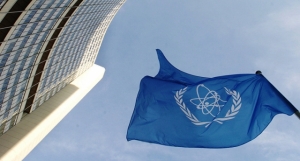Russia Boycotts International Nuclear Security Summit
WASHINGTON D.C. – Russia has opted to boycott an upcoming nuclear security summit to discuss measures aimed at preventing terrorist groups from obtaining weapons-grade radioactive materials.
Moscow’s decision to snub the summit has been widely panned by the other participants, who see Russia’s absence as a major blow to the international community’s efforts to better coordinate the arms control measures of the world’s main nuclear powers.
Russia overwhelmingly has the world’s largest nuclear weapons arsenal, with nearly 5,000 active warheads at its disposal. In recent years the Kremlin has overtly blocked any cooperation with organizations headed by Western powers, specifically those from the US and UK, after Russian President Vladimir Putin accused both governments of trying to dictate nuclear arms reduction terms.
Russia’s Foreign Ministry spokeswoman Maria Zahkarova reiterated Putin’s comments when she announced in late January that Moscow had no intention of attending the 31 March-1 April summit, saying the meeting only took into consideration "the opinions of a specific group of states."
Her comment was widely seen at the time as a thinly veiled reference to the summit’s NATO members, whom Russia considers its main foes.
This year’s gathering marks the fourth security summit held in as many years. Russia had sent delegates to the first three meetings, which led to the elimination of weapons-grade uranium from 12 countries that were deemed susceptible to terrorist activities, including the theft of nuclear materials.
“All they're doing is isolating themselves by not participating, as they have in the past," Ben Rhodes, a top official on the White House National Security Council, told reporters in a conference call Wednesday. “Their decision to boycott the summit is a serious concern,” he added.
Zakharova’s comments are the latest in a series of provocative measures taken by Putin’s Kremlin as it de-couples from most international nuclear watch organizations.
In early 2015, Russia formally ended a two decade-old, U.S.-funded program to scrap obsolete nuclear weapon systems and secure facilities where Soviet-era radiological material was stored.
Since Putin’s February 2014 invasion of Ukraine’s Crimea Peninsula, however, Russia has repeatedly threatened to redeploy tactical and intern-continental ballistic missiles to its Kaliningrad exclave on the Polish border and the since-annexed Crimea in effort to deter the West from expanding the NATO deeper into the republics that once made up the Soviet Union.
Despite Moscow refusing to attend the summit and as relations between Russia and the West continue to deteriorate to their lowest point since the Cold War, Russia has thus far continued to implement the New START treaty signed by US President Barack Obama and then-Russian President Dmitry Medvedev in 2010.
The treaty calls for both nuclear powers to cut their number of strategic nuclear missile launchers by half.
Georgia’s President Giorgi Margvelashvili and President Petro Poroshenko of Ukraine will also attend the summit. Both hope to discuss security guarantees from the other participants amid growing concerns in each country that Moscow-backed separatist movements in Georgia’s breakaway Abkhazia and South Ossetia regions and Ukraine’s Donbass could try and procure or sell nuclear material.
A recent incident in the impoverished former Soviet republic of Moldova that involvied the smuggling of radioactive materials by members of Russia’s FSB security services with ties to Russian organized crime has deeply alarmed Kyiv and Tbilisi, both of whom fear similar incidents within their own borders.
By Nicholas Waller












